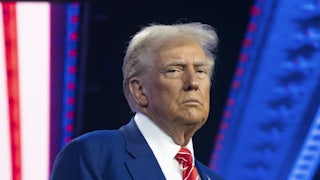NBC News’s Vaughn Hillyard and ABC News’s Jonathan Karl recently made a journalistic misstep by interviewing Steve Bannon right before he reported to prison. This move, which might seem innocuous at first glance, actually elevates Bannon’s “political prisoner” narrative, a misleading storyline that does little but bolster the War Room host’s victim complex.
By interviewing Bannon just before he heads to prison, both NBC and ABC are essentially giving him a platform to paint himself as a martyr.
It allows Bannon to control the narrative. This plays directly into the hands of Bannon and his supporters, who are eager to cast any legal action against them as part of a broader conspiracy to silence dissent. It’s a classic tactic: position yourself as a victim to garner sympathy and rally support.
But Bannon is not going to prison for his political beliefs or his support for Donald Trump. He’s going to prison because he defied a congressional subpoena. By allowing Bannon to put some focus on his claims of political persecution, these interviews shift attention away from his actual misconduct and the legal consequences of that misconduct. This undermines the rule of law and gives credence to the idea that powerful individuals can evade accountability by crying foul.
Beyond that, it normalizes extremist rhetoric. In his interview with Karl, Bannon doubled down on his inflammatory language, discussing “retribution” and the need for investigations and potential imprisonments of political figures. Bannon listed former FBI Director James Comey, FBI Deputy Director Andrew McCabe, former Defense Secretary Mark Esper, former Joint Chiefs Chairman Mark Milley, Attorney General Merrick Garland, and former Attorney General Bill Barr as people who should be “very worried” about prosecution under a second Trump administration. Bannon defended his use of the slogan “Victory or Death!” at the recent Turning Point Action convention and rolled his eyes at Karl for even asking him about his 2020 comments about beheading Dr. Anthony Fauci and FBI Director Christopher Wray.
Such rhetoric is dangerous and shouldn’t be so casually invited into our living rooms.
Interviews like these should be conducted critically, providing context and challenging the interviewee’s assertions. Instead, by timing these interviews to coincide with Bannon’s prison sentence, NBC and ABC have allowed themselves to become tools in his hateful propaganda machine.
In journalism, timing is everything. Interviewing Bannon at this moment has given Bannon a megaphone to spread his dangerous narrative virtually unchecked while framing himself as the victim of an unjust system, undermining both the integrity of the media and the public’s understanding of the issues at hand.
As news consumers, we must be critical of the content presented to us and the motives behind its presentation. And as journalists, there is a responsibility to not just report but report responsibly. By elevating voices like Bannon’s without adequate scrutiny, NBC and ABC have failed in this regard.
This is not to say that Bannon’s words are entirely without value. Karl and Hillyard note early in their interviews that Bannon still has Donald Trump’s ear and regularly communicates with the presumptive Republican nominee. He can provide insight into what a second Trump administration will look like, should it come to pass. However, as Bannon pointed out during his interview with Karl, a good portion of that is already outlined in the Heritage Foundation’s 900-page Project 2025 document.
We already know what Bannon interviews tend to get us: lists of political enemies he’d like to see behind bars, a drumbeat of lies about the 2020 election results, and some scary stories about another Trump administration. I decided to talk to someone who spends a lot of time monitoring Bannon and his War Room show. Media Matters for America deputy director of rapid response Madeline Peltz is as close a thing to a Bannon expert as exists on the planet, and she was gracious enough to answer a few questions via email about these interviews. She wrote a really smart and thorough piece of her own on the MMFA website that’s worth checking out.
From our discussion, I’ve gleaned that it’s unlikely the press will stop interviewing Bannon. So what we should hope for is better interviews and coverage of him.
According to Peltz, urging the press to avoid Bannon is probably a fruitless endeavor. “It’s just too tempting given the size and power of his audience, his proximity to Trump, and the charm offense he puts on when he invites reporters into the War Room studio on Capitol Hill, making them feel like by being there they’re getting some kind of inside scoop, when they’re really just walking in an open door many others have passed through.”
If he’s going to be interviewed, she argues, the goal should be to “expose and explain.” This didn’t happen during these recent interviews.
“I don’t think it’s a good use of time to try to convince them not to, anyway,” she says. “I think the goal of an interview with Bannon has to be to expose and explain: expose his extremism by letting him convey his point of view, then explain and provide context as to what are the consequences, as well as fact-checking his lies. This is a difficult needle to thread, and most mainstream political reporters are instead drawing into a battle of egos that they inevitably lose. You saw that especially on ABC.”
A good Bannon interview, which Peltz admits is rare (when I asked for an example of a “good” one, Peltz pointed me to this lengthy June 2022 piece by Jennifer Senior at The Atlantic), can “provide insight into what the MAGA base is hearing and absorbing in their media bubble” while also contextualizing and fact-checking the lies that inevitably pop up. “It teaches the broader public what’s happening inside conspiracy land, then explains why it matters.”
Maybe they’ll get it right next time and won’t let him frame himself as a victim. Maybe.






